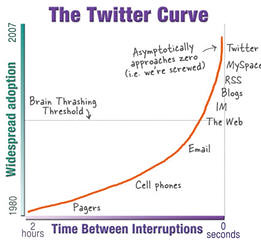Jargon: Granularity
Translation: Detail. People generally refer to a “level of granularity” and that just means how much detail is used.

Ten people to follow on Twitter if you’re interested in international development. Not the top ten, necessarily – there are too many great people on Twitter for me to make that claim. But ten microbloggers who consistently engage my attention with interesting ideas:
Glenna Gordon – @Scarlettlion
Glenna Gordon is a journalist, photographer, and author of the Scarlett Lion blog, currently living in Uganda. Her writing, and the links she posts, offer beautifully written insight into Uganda, with a solid dose of cynicism and wry humor.
Sample tweet: Supermodel risks TB and Genocide by visitng Rwanda: Monika Schnarre, who considers herself a supermo.. http://tinyurl.com/65aymn
Why you should follow: For links to photos and articles on Uganda, Africa, and development which you wouldn’t have found on your own.
Chris Albon – @chrisalbon
Chris Albon is author of the amazing War and Health blog, and posts a great series of links on war and conflict.
Sample tweet: For the past 2 weeks I’ve been writing post on armed groups potentially exploiting Ushahidi. This is what I mean: http://tinyurl.com/56bes7
Why you should follow: For links to a huge range of articles and resources on conflict in general and conflict and health. He’s obsessed with the intersection of war and health, and obsessed people make great reading.
Vasco Pyjama – @vasco_pyjama
Vasco Pyjama is an aid worker who’s been everywhere, including Somalia and Afghanistan.
Sample tweet: Documenting lessons learnt and writing up methodologies. At first I thought I had indigestion. Now I realise it’s heartache.
Why you should follow: For a self-aware, intelligent, first-person perspective on aid work and its discontents.
Glenn Strachan – @glennstrachan
Glenn Strachan travels the planet supporting ICT for development. He blogs as well as using Twitter.
Sample tweet: Right now I am trying to assemble a list of the top 30 organisations worldwide doing work specifically in ICT4D. There is no list.
Maneno – @maneno
The twitter account of Maneno.org, which is devoted to making African voices heard.
Sample tweet: Toivo Asheeke’s latest post on his Maneno blog, “A Brief Case Study of A Successful African Country” (Namibia) http://tinyurl.com/6mste4
Why you should follow: To keep your news sources broad and deep.
I’ve got five more profiles coming up in my next post: @maratraingle, @chriswaterguy, @nadodi, @guaravanomics, and @joncamfield. Who am I missing? Tell me in the comments.
***
(photo credit: FunnyBiz)
Chosen because I love graphs.
Translation: This piece of jargon bugs me because it used to have a meaning and it doesn’t any more. The original meaning was pleasingly specific and complex. It meant finding a way to measure a nebulous concept. For example, you might want to measure a nation’s level of happiness. You could operationalize that – find something to measure – by using the number of cheerful songs played on national radio, or the number of depression diagnoses.
That useful definition, however, is now long gone. Instead, operationalize means whatever people want it to mean. Usually they use it to mean something like implement, operate, or do.
My father was born in Calcutta in 1939. His family rode the death trains in 1946, after their apartment complex was firebombed. They ended up in Karachi, with the rest of the IDPs, who, of course, became refugees once the subcontinent split. In 1962 my dad went to Canada – to study at McGill – and never lived in Pakistan again.
I am a native speaker of the world’s language of privilege. I have never gone truly hungry, I have two degrees, and I didn’t give birth until the age of thirty. These things are true not because of any particular giftedness on my part. They are true solely because I was born in Syracuse, New York instead of Karachi, Pakistan.
This wouldn’t be true if my father had left school when his parents wanted him to. If he’d decided to study in Islamabad instead of Montreal. If he’d married the girl arranged for him instead of choosing my mom and breaking with his family. If he’d married a woman who could go back to Pakistan with him.
One path un-followed, just one, and I would not be the aid worker blogging here about the need to treat your local partners well. Instead, I’d be that local partner fighting for respect. I’d have less money, more health risks, fewer choices in my life and a shorter life in which to make those choices. I’d have to struggle to make a good life instead of having it handed to me.
And so, every year on Thanksgiving, I am thankful for the hard choices my father made, for the life he won for his children. I am thankful for the freedom of movement that let his family flee for their lives, and let my father make himself a new life.
And I remember: I did nothing to earn this.
****
(photo credit: my mom)
From left to right: My dad, myself, my brother. Maybe six years ago.
Development work is designed to change people’s lives. Its specific goal is impacting human beings and the way they live. Done badly, it does damage. This makes it inherently serious, as serious as practicing law or medicine and it should be treated that way. If you want to practice medicine, you don’t start your own clinic. You go to medical school.
I am not telling you not to get involved. We need good people working in development. We need them desperately. But warm bodies and enthusiasm don’t help people. Good programs help people. And it’s very hard to create good programs if you are starting from scratch. There is an enormous body of knowledge, both academic and practical, on how to improve peoples’ lives. Not taking advantage of that body of knowledge is unfair to everyone involved.

I’ve got a lot of blogs in my RSS reader. 166, to be precise. And I treat it like an email inbox, and I keep up with it. They’re smart blogs, and I love the feeling of learning new stuff all the time. Sometimes, though, I want to step out of the familiar blog comfort zone. You need a little randomness to generate new ideas. You need synergy. This is what I read to find that:
Trackernews – It’s still in beta, but I am already impressed. It is a human-curated news and information site specifically designed to help readers make new connections.
Silobreaker – Another aggregator site designed to inspire insight. It’s intended to break down the walls between different disciplines and broaden your perspective. I really like the Network search function.
Worldchanging – Styled as an online magazine, it features articles and blog posts on a range of topics, withing a general theme of achieving positive change. It’s a combination of aggregated content from other places and original writing.
ChangeThis – ChangeThis is made up of manifestos, mostly related to marketing and business. All original content.
PlusNews – HIV-related news from all over the world. Original content, written by journalists for PlusNews. HIV/AIDS is a multi-faceted problem, with a multitude of causes and responses. In many ways, it’s a microcosm of most of the challenges facing the world. Think about HIV and you’re thinking about everything.
Edited to add: Commenters Ryan and Peter have added some excellent sources. Take a look.
****
(photo credit: StrangrThanCandy)
Chosen because I really had no idea what to illustrate this entry with, and it’s a cool looking picture. I think it looks kind of like a world map.